July 2024
Heel Pain Can Be Treated!
Causes and Sensations of Foot Stress Fractures
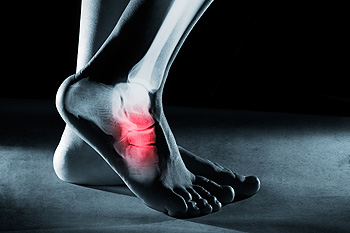
A foot stress fracture manifests as a small crack or severe bruising within a bone, typically caused by repetitive force or overuse, such as high-impact activities like running or jumping. This injury often results from sudden increases in activity intensity or duration, wearing inadequate footwear support, or changes in training surfaces. Symptoms can include localized pain and tenderness, swelling, and difficulty bearing weight on the affected foot. The pain associated with a stress fracture is often described as dull and achy initially, worsening with activity and subsiding with rest. In some cases, there may be a noticeable tenderness or throbbing sensation at the fracture site. Prompt diagnosis through imaging techniques like X-rays or MRI scans is essential to differentiate a stress fracture from other foot injuries and initiate appropriate treatment. If you have foot pain, and believe it may be a stress fracture, it is suggested that you visit a podiatrist who can determine what the most appropriate course of treatment is for you.
Stress fractures occur when there is a tiny crack within a bone. To learn more, contact Dr. Lee R. Stein from Lake Shore Foot & Ankle, PC. Our doctor can provide the care you need to keep you pain free and on your feet.
How Are They Caused?
Stress fractures are the result of repetitive force being placed on the bone. Since the lower leg and feet often carry most of the body’s weight, stress fractures are likely to occur in these areas. If you rush into a new exercise, you are more likely to develop a stress fracture since you are starting too much, too soon. Pain resulting from stress fractures may go unnoticed at first, however it may start to worsen over time.
Risk Factors
- Gender – They are more commonly found in women compared to men.
- Foot Problems – People with unusual arches in their feet are more likely to develop stress fractures.
- Certain Sports – Dancers, gymnasts, tennis players, runners, and basketball players are more likely to develop stress fractures.
- Lack of Nutrients – A lack of vitamin D and calcium may weaken the bones and make you more prone to stress fractures
- Weak Bones – Osteoporosis can weaken the bones therefore resulting in stress fractures
Stress fractures do not always heal properly, so it is important that you seek help from a podiatrist if you suspect you may have one. Ignoring your stress fracture may cause it to worsen, and you may develop chronic pain as well as additional fractures.
If you have any questions, please feel free to contact one of our offices located in Chicago, Highland Park, and Uptown, IL . We offer the newest diagnostic and treatment technologies for all your foot care needs.
The Wrong Shoe Size Can Cause Foot Problems
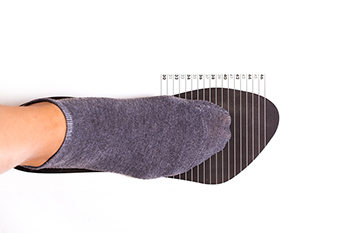
Wearing shoes that are too big or too small can lead to various foot problems. Tight shoes can cause blisters, bunions, and calluses due to constant friction and pressure. On the other hand, shoes that are too loose can result in foot instability, increasing the risk of sprains and strains. To find the right shoe size, measure your feet at the end of the day when they are most swollen. Ensure there is enough room in the toe box for your toes to move freely, and the shoe should fit snugly around the heel without slipping. Trying on shoes with the type of socks you plan to wear with them can also help achieve a proper fit. If you have developed foot conditions from wearing the wrong size shoes, it is suggested that you speak to a podiatrist who can treat various foot ailments and provide education for proper foot measurement.
It is important to find shoes that fit you properly in order to avoid a variety of different foot problems. For more information about treatment, contact Dr. Lee R. Stein from Lake Shore Foot & Ankle, PC. Our doctor will treat your foot and ankle needs.
Proper Shoe Fitting
Shoes have many different functions. They cushion our body weight, protect our feet, and allow us to safely play sports. You should always make sure that the shoes you wear fit you properly in order to avoid injuries and deformities such as: bunions, corns, calluses, hammertoes, plantar fasciitis, stress fractures, and more. It is important to note that although a certain pair of shoes might be a great fit for someone else, that doesn’t mean they will be a great fit for you. This is why you should always try on shoes before buying them to make sure they are worth the investment. Typically, shoes need to be replaced ever six months to one year of regular use.
Tips for Proper Shoe Fitting
- Select a shoe that is shaped like your foot
- Don’t buy shoes that fit too tight, expecting them to stretch to fit
- Make sure there is enough space (3/8” to ½”) for your longest toe at the end of each shoe when you are standing up
- Walk in the shoes to make sure they fit and feel right
- Don’t select shoes by the size marked inside the shoe, but by how the shoe fits your foot
The shoes you buy should always feel as good as they look. Shoes that fit properly will last longer, feel better, and improve your way of life each day.
If you have any questions, please feel free to contact one of our offices located in Chicago, Highland Park, and Uptown, IL . We offer the newest diagnostic and treatment technologies for all your foot care needs.
Dangers of Blood Clots in Your Foot
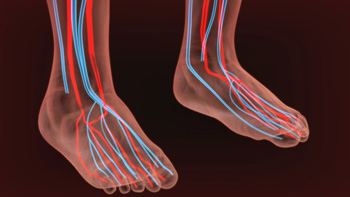
Blood clots in the feet, also known as venous blood clots, pose significant health risks and require immediate medical attention. These clots can be caused by several factors, including poor blood circulation due to prolonged sitting or lying down, diabetes, and dehydration. Damaged veins from injury, infection, or surgery are other contributing factors. In addition, blood clots in the feet can result from taking certain medications like birth control pills, hormone therapy drugs, glucocorticoids, and antidepressants. Symptoms such as swelling, discoloration, varicose veins, and intense pain or numbness in the foot are indicators of potential blood clots. If left untreated, blood clots can travel to vital organs, potentially causing life-threatening conditions like pulmonary embolism, heart attack, or stroke. A podiatrist can play a critical role in managing blood clots in the feet by diagnosing the condition, providing appropriate treatments like blood thinners or thrombolytic therapy, and offering preventive measures. If you have developed blood clots in the feet, it is suggested that you make an appointment with a podiatrist for an exam and treatment options.
Poor circulation is a serious condition and needs immediate medical attention. If you have any concerns with poor circulation in your feet contact Dr. Lee R. Stein of Lake Shore Foot & Ankle, PC. Our doctor will treat your foot and ankle needs.
Poor Circulation in the Feet
Poor blood circulation in the feet and legs is can be caused by peripheral artery disease (PAD), which is the result of a buildup of plaque in the arteries.
Plaque buildup or atherosclerosis results from excess calcium and cholesterol in the bloodstream. This can restrict the amount of blood which can flow through the arteries. Poor blood circulation in the feet and legs are sometimes caused by inflammation in the blood vessels, known as vasculitis.
Causes
Lack of oxygen and oxygen from poor blood circulation restricts muscle growth and development. It can also cause:
- Muscle pain, stiffness, or weakness
- Numbness or cramping in the legs
- Skin discoloration
- Slower nail & hair growth
- Erectile dysfunction
Those who have diabetes or smoke are at greatest risk for poor circulation, as are those who are over 50. If you have poor circulation in the feet and legs it may be caused by PAD and is important to make changes to your lifestyle in order to reduce risk of getting a heart attack or stroke. Exercise and maintaining a healthy lifestyle will dramatically improve conditions.
As always, see a podiatrist as he or she will assist in finding a regimen that suits you. A podiatrist can also prescribe you any needed medication.
If you have any questions please feel free to contact one of our offices located in Chicago, Highland Park, and Uptown, IL . We offer the newest diagnostic and treatment technologies for all your foot and ankle needs.
Importance of Foot Examinations for Older People
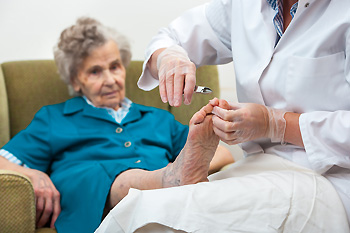 Foot exams are important for older adults, as aging often brings about various foot problems that can significantly impact mobility and increase the risk of falls. Over time, feet undergo changes such as loss of fat padding, reduced blood circulation, and structural alterations, making them more susceptible to conditions like arthritis, bunions, and plantar fasciitis. Additionally, common age-related issues like diabetes can lead to neuropathy and other complications that exacerbate foot problems. Regular foot care becomes more critical with age, as maintaining foot health directly contributes to overall well-being and independence. If self-care becomes challenging, it is essential to seek assistance from caregivers or healthcare professionals to ensure proper hygiene and monitoring. Routine foot exams involve checking for signs of skin breakdown, infections, deformities, and circulation issues. A podiatrist may also assess gait and balance to prevent falls. If you are a senior, it is suggested that you schedule an appointment with a podiatrist for comprehensive foot care, as they specialize in diagnosing and treating foot-related issues.
Foot exams are important for older adults, as aging often brings about various foot problems that can significantly impact mobility and increase the risk of falls. Over time, feet undergo changes such as loss of fat padding, reduced blood circulation, and structural alterations, making them more susceptible to conditions like arthritis, bunions, and plantar fasciitis. Additionally, common age-related issues like diabetes can lead to neuropathy and other complications that exacerbate foot problems. Regular foot care becomes more critical with age, as maintaining foot health directly contributes to overall well-being and independence. If self-care becomes challenging, it is essential to seek assistance from caregivers or healthcare professionals to ensure proper hygiene and monitoring. Routine foot exams involve checking for signs of skin breakdown, infections, deformities, and circulation issues. A podiatrist may also assess gait and balance to prevent falls. If you are a senior, it is suggested that you schedule an appointment with a podiatrist for comprehensive foot care, as they specialize in diagnosing and treating foot-related issues.
If you need your feet checked, contact Dr. Lee R. Stein of Lake Shore Foot & Ankle, PC. Our doctor will attend to all of your foot and ankle needs and provide you with quality treatment.
Geriatrics and Podiatry
When people age, some common issues that may occur are bone density loss, dry skin, poor circulation, and rough brittle nails. These issues may also affect your foot health if the necessary steps are not taken to alleviate the problems.
It is important to take care of your feet because feet that are injured or diseased can affect your overall health. Having painful feet hinders your ability to do daily activities or may decrease your willingness to do the things that you need to do.
Visiting Your Geriatrician
As we age, health problems become more likely, so it is essential to visit your doctor for check-ups to ensure that you are doing the best you can to take care of your health. It is recommended to check your feet frequently for any possible cuts, bruises, swelling, corns or any other irregularities.
Taking Care of Elderly Feet
Cracked or dry feet can be treated by applying moisturizer often. It is also important not to wear old socks because the older the sock is, the higher the possibility there will be that there is bacteria there. Wear fresh socks and make sure they fit properly.
Proper foot health means that you can have a more active lifestyle and you will not be bogged down by pain. Foot health also leads to good circulation, which is paramount for overall health.
If you have any questions, please feel free to contact one of our offices located in Chicago, Highland Park, and Uptown, IL . We offer the newest diagnostic tools and technology to treat your foot and ankle needs.
Causes and Risk Factors for Plantar Fasciitis
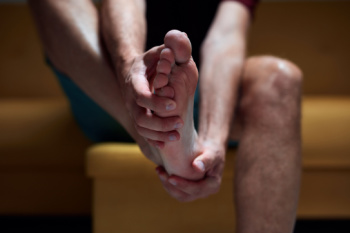
Plantar fasciitis, a common cause of heel pain, occurs due to inflammation of the plantar fascia, a thick connective tissue running along the sole of the foot. This tissue supports the arch and absorbs shock during walking and running, but excessive strain can lead to tiny tears and inflammation. High-risk groups for plantar fasciitis include runners, dancers, and those who stand for prolonged periods, such as sales assistants. Other contributing factors can include foot deformities like flat feet or high arches, tight calf muscles, or Achilles tendons. Wearing inappropriate footwear and obesity are other factors. Symptoms of plantar fasciitis often include severe burning or stabbing pain, especially noticeable with the first steps in the morning or after long periods of inactivity. Although the pain may subside with movement, it can return after strenuous activity. With advancing age, the risk increases as the tissue loses elasticity and the fat pads under the heel thin out. If you are experiencing pain in the bottom of the foot, it is suggested that you schedule an appointment with a podiatrist for an exam and treatment options.
Plantar fasciitis can be very painful and inconvenient. If you are experiencing heel pain or symptoms of plantar fasciitis, contact Dr. Lee R. Stein from Lake Shore Foot & Ankle, PC. Our doctor can provide the care you need to keep you pain-free and on your feet.
What Is Plantar Fasciitis?
Plantar fasciitis is the inflammation of the thick band of tissue that runs along the bottom of your foot, known as the plantar fascia, and causes mild to severe heel pain.
What Causes Plantar Fasciitis?
- Excessive running
- Non-supportive shoes
- Overpronation
- Repeated stretching and tearing of the plantar fascia
How Can It Be Treated?
- Conservative measures – anti-inflammatories, ice packs, stretching exercises, physical therapy, orthotic devices
- Shockwave therapy – sound waves are sent to the affected area to facilitate healing and are usually used for chronic cases of plantar fasciitis
- Surgery – usually only used as a last resort when all else fails. The plantar fascia can be surgically detached from the heel
While very treatable, plantar fasciitis is definitely not something that should be ignored. Especially in severe cases, speaking to your doctor right away is highly recommended to avoid complications and severe heel pain. Your podiatrist can work with you to provide the appropriate treatment options tailored to your condition.
If you have any questions please feel free to contact one of our offices located in Chicago, Highland Park, and Uptown, IL . We offer the newest diagnostic and treatment technologies for all your foot and ankle needs.
Blog Archives
- March 2025
- February 2025
- January 2025
- December 2024
- November 2024
- October 2024
- September 2024
- August 2024
- July 2024
- June 2024
- May 2024
- April 2024
- March 2024
- February 2024
- January 2024
- December 2023
- November 2023
- October 2023
- September 2023
- August 2023
- July 2023
- June 2023
- May 2023
- April 2023
- March 2023
- February 2023
- January 2023
- December 2022
- November 2022
- October 2022
- September 2022
- August 2022
- July 2022
- June 2022
- May 2022
- April 2022
- March 2022
- February 2022
- January 2022
- December 2021
- November 2021
- October 2021
- September 2021
- August 2021
- July 2021
- June 2021
- May 2021
- April 2021
- March 2021
- February 2021
- January 2021
- December 2020
- November 2020
- October 2020
- September 2020
- August 2020
- July 2020
- June 2020
- May 2020
- April 2020
- March 2020
- February 2020
- January 2020
- December 2019
- November 2019
- October 2019
- September 2019
- August 2019
- July 2019
- June 2019
- May 2019
- April 2019
- March 2019
- February 2019
- January 2019
- December 2018
- November 2018
- October 2018
- September 2018
- August 2018
- July 2018







